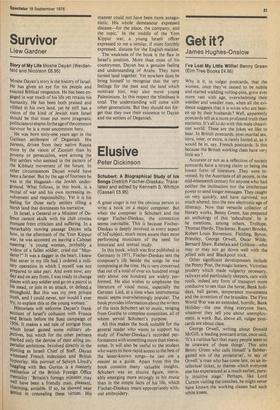Get it?
James Hughes-Onslow
I've Lost My Little Willie! Benny Green (Elm Tree Books £4.95)
Why is it, in vulgar postcards, that the women, once they've ceased to be nubile and started wielding rolling-pins, grow ever more vast with age, overwhelming their weedier and weedier men, when all the evidence suggests that it is wives who are beaten up by their husbands? Well, apparently postcards tell us a more profound truth than statistics. It's all to do with this male chauvinist world. These are the jokes we like to hear. In British postcards, post-marital sex, intra, inter, or extra, is rarely hinted at, as it would be in, say, French postcards. Is this because the British working class have very little sex ?
Accurate or not as a reflection of society postcards have a strong claim to being the lowest form of literature. They were invented, by the Austrians of all people, in the mid-nineteenth century for anyone who had neither the inclination nor the intellectual power to send longer messages. They caught on very quickly, and have survived, not much altered, into the new electronic age of illiteracy. Now that versatile collector of literary works, Benny Green, has prepared an anthology of this 'subculture'. In it he mentions, among others, Trollope, Thomas Hardy, Thackeray, Rupert Brooke, Robert Louis Stevenson, Fielding, Byron, Priestley, George Orwell, Oscar Wilde, Bernard Shaw, Rabelais and Gibbon—who may or may not go down well with the jellied eels and Blackpool rock.
Other significant developments include the Penny Post, the magic lantern, Victorian prudery which made vulgarity necessary, railways and particularly sleepers, cars with roofs, indeed any form of transport more conducive to sex than the horse, Bank holidays, ball games, temperance movements and the invention of the brassiere. The First World War was an extended, horrific, Bank Holiday—the one thing everyone fears, whatever they tell you about unemployment, is work. But, above all, vulgar postcards are about class.
George Orwell, writing about Donald McGill, a leading postcard artist, once said, 'It's a curious fact that many people seem to be unaware of these things'. This stirs Benny Green who calls himself 'a flabbergasted son of the proletariat', to say of Orwell 'a man who has come late, on an intellectual ticket, to themes which everyone else has experienced at a much earlier, purely intuitive stage.' Perhaps, like Lord Curzon visiting the trenches, he might never have known the working classes had such white knees.





































 Previous page
Previous page